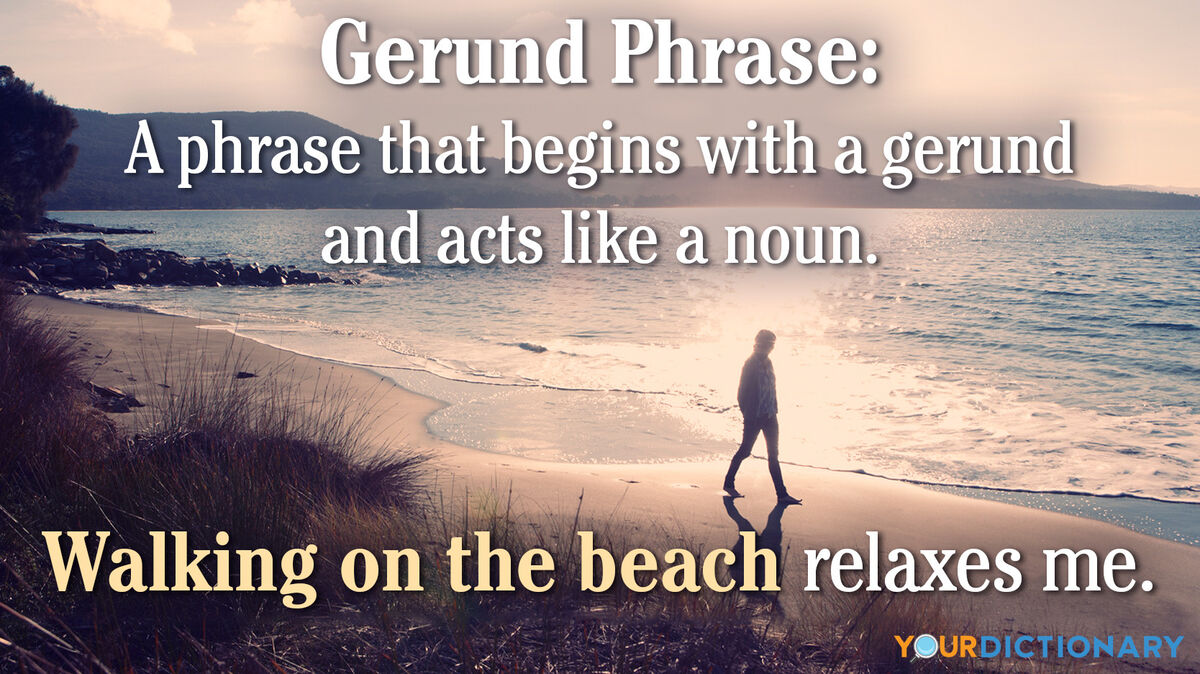
Gerund phrases are a tricky bunch because they’re created out of verbs but function as nouns. Once you can identify a gerund phrase, you'll know more about the sentence's structure. Keep reading to learn more about gerund phrases and how they work.
What Is a Gerund Phrase?
Gerund phrases begin with gerunds, which are -ing verbs that function as nouns. Examples of gerunds in simple sentences include:
- I love swimming.
- Performing is so fun.
- Walking relaxes me.
You can replace swimming, performing and walking with other nouns and the sentences would still make sense. That's because these words are functioning as nouns, not verbs. Gerund phrases are formed when you add more words to the gerund in a sentence, such as:
- I love swimming in the pool.
- Performing with my band is so fun.
- Walking on the beach relaxes me.
A gerund phrase starts with a gerund and includes other modifiers or objects. Knowing that gerunds always function as nouns, remember that gerund phrases will also serve as nouns. We’ll see them in one of four positions in a sentence: subject, subject complement, object, or object of a preposition.
Gerund Phrases as Subjects
As the subject of a sentence, a gerund phrase will be the main focus, or what the sentence is about. The gerund phrase is actually performing the action in the sentence. Examples of gerund phrases as subjects include:
- Drinking cocoa is the perfect way to end a rainy day.
- Running with her dog exhilarates Marcy every morning.
- Reading from a poetry anthology warms Aaron's heart and soul.
- Working through the night leads to stress and insomnia.
The verbs in these sentences are "is," "exhilarates," "warms," and "leads." The gerund phrases are performing these actions, and the rest of the sentence explains more about the gerund phrase.
Gerund Phrases as Subject Complements
With subject complements (and predicate nominatives in particular) in mind, let’s take a look at a gerund phrase acting in that capacity. Gerund phrases that act as subject complements follow forms of the verb "to be," such as "is," "were" and "have been." Here are some examples:
- Jon's activity of choice has been playing tennis at the local club.
- The school activity Mary hated the most was taking algebra exams.
- My goal for the weekend is sleeping until noon.
- The most challenging part of the workout has been running uphill.
Notice how these gerund phrases follow the verb of the sentence but modify the subject rather than the verb itself. You can substitute any of these gerund phrases with another noun, such as "basketball,"
Gerund Phrases as Objects
The object of the sentence is something that’s receiving the action of the verb. A typical sentence will have a subject, a verb indicating what that subject is doing, and an object that’s responding to the verb. Here are some examples of gerund phrases functioning as objects.
- Happy dogs enjoy playing with plush toys.
- Maggie hates boarding planes amidst pushy people.
- Mindfulness requires taking yourself out of your comfort zone.
- I practiced breathing through my nose.
These gerund phrases answer questions posed by the verbs in the sentence. For example, what do happy dogs enjoy? (Playing with plush toys.) What did you practice? (Breathing through my nose.) You can also replace these phrases with basic nouns to ensure that they are in fact gerund phrases.
Gerund Phrases as Objects of Prepositions
Like all nouns, you can use gerund phrases as objects of prepositions in a sentence. That means they follow a preposition in the sentence to provide more information. For example:
- Guillermo won the race by sprinting faster than the other runners.
- We meet every month to talk about parenting and other baby issues.
- My doctor wrote me a note to excuse me from playing volleyball for a week.
- Double-check your message before sending an angry email.
Keep an eye out the next time you encounter a gerund phrase in your reading. See if you can determine how it's functioning, and how much more information it supplies in a sentence!
Gerunds: Just One Kind of Verbal Phrase
When used properly, gerunds and gerund phrases are a nice way to beef up our nouns. But they are only one kind of verbal phrase that can improve your writing and add more information. See how gerund phrases differ from infinitive phrases with these examples of infinitive phrases.